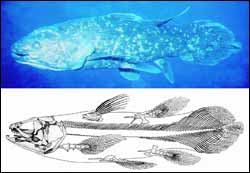Living fossil roams the seas

Latimera - How different are the coelacanth’s genes from those of other fishes and tetrapods? And can the species be useful as a tool for vertebrate comparative genomics?”
Genomics is being used for the first time to investigate the mystery of the ‘living fossil’ fish coelacanth, first dragged up along the coast of South Africa in 1938, having been considered extinct for 65 million years. Because of its close resemblance to land animals, it has attracted attention to the subject of a ‘missing link’ between tetrapods and humans. Dr. Chris Amemiya will be presenting his work on the generation and utilization of genomic resources for the Indonesian coelacanth on Wednesday 13th July at the Society for Experimental Biology Annual Main Meeting in Barcelona [session A5].
These genomic resources make it possible to investigate extended gene regions in order to analyse evolutionary relationships with other animals. Genes of particular interest have been those involved in embryonic development and immunity. “There are two questions we are trying to answer”, explains Amemiya. “How different are the coelacanth’s genes from those of other fishes and tetrapods? And can the species be useful as a tool for vertebrate comparative genomics?”
Media Contact
More Information:
http://www.sebiology.org/vcsearch.aspAll latest news from the category: Life Sciences and Chemistry
Articles and reports from the Life Sciences and chemistry area deal with applied and basic research into modern biology, chemistry and human medicine.
Valuable information can be found on a range of life sciences fields including bacteriology, biochemistry, bionics, bioinformatics, biophysics, biotechnology, genetics, geobotany, human biology, marine biology, microbiology, molecular biology, cellular biology, zoology, bioinorganic chemistry, microchemistry and environmental chemistry.
Newest articles

Trotting robots reveal emergence of animal gait transitions
A four-legged robot trained with machine learning by EPFL researchers has learned to avoid falls by spontaneously switching between walking, trotting, and pronking – a milestone for roboticists as well…

Innovation promises to prevent power pole-top fires
Engineers in Australia have found a new way to make power-pole insulators resistant to fire and electrical sparking, promising to prevent dangerous pole-top fires and reduce blackouts. Pole-top fires pose…

Possible alternative to antibiotics produced by bacteria
Antibacterial substance from staphylococci discovered with new mechanism of action against natural competitors. Many bacteria produce substances to gain an advantage over competitors in their highly competitive natural environment. Researchers…





















